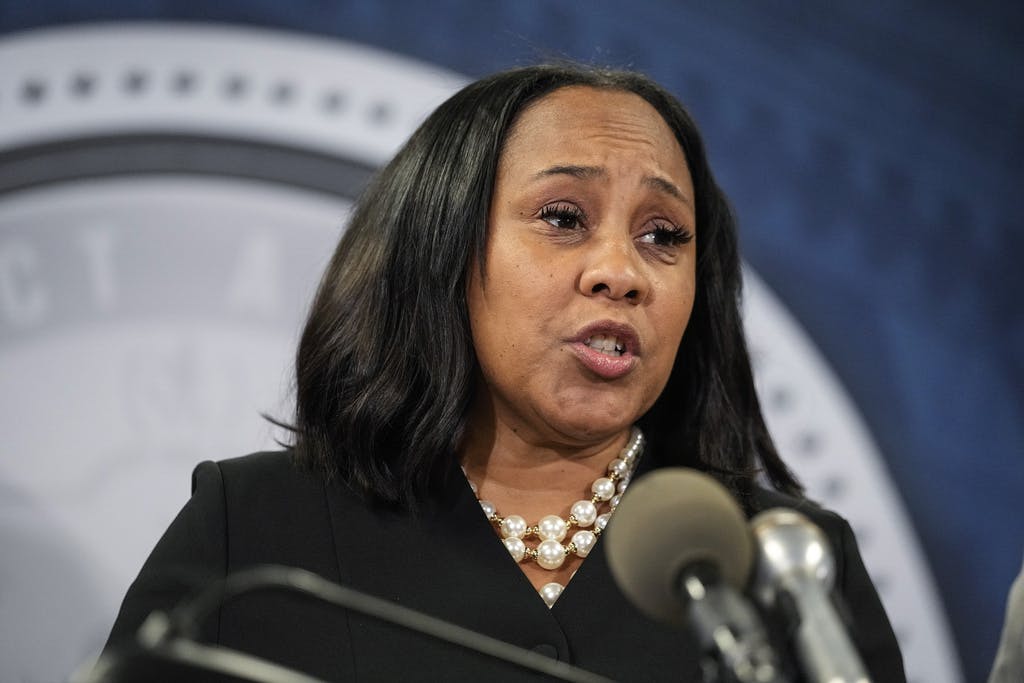As Trump Readies for His Mugshot, Fani Willis Works To Prevent a Stampede to Federal Court
To keep the 45th president under the jurisdiction of Georgia, the Fulton County prosecutor will have to show that he lacked a constitutional role in his own re-election.

A filing by District Attorney Fani Willis hours before President Trump is set to turn himself in at the Fulton County Jail brings into focus the constitutional stakes raised by charging a former president of America and his innermost circle.
Ms. Willis, the latest filings show, intends to lean on the Hatch Act, a law from 1939 that prohibits federal officials from using their “official authority or influence for the purpose of interfering with or affecting the result of an election.” That, though, could be leaving Ms. Willis open to being outmaneuvered by Mr. Trump.
That’s because the act does not apply to presidents and vice presidents, and figures from both parties have been accused of violating its restrictions. In 1973, the Supreme Court, in a 6-to-3 decision, upheld the constitutionality of the Hatch Act. The dissenters were the court’s liberal lions — Justices Thurgood Marshall, William Douglas, and William Brennan.
They wrote, “It is no concern of government what an employee does in his or her spare time, whether religion, recreation, social work or politics is his hobby, unless what he or she does impairs efficiency or other facets of the merits of his job.”
Ms. Willis’s memorandum, lodged with the United States District Court for the Northern District of Georgia, took the form of a response to Mr. Trump’s erstwhile chief of staff, Mark Meadows, who is angling for his case to be heard in federal court.
Ms. Willis would have her state charges be heard in a Georgia tribunal. The district attorney begins with a broadside, arguing that Mr. Meadows’s “lack of care for the lawful scope of his official duties is a matter of record.”
She accuses him of violating the Hatch Act, which bars executive branch employees from engaging in political activity. An Office of Special Counsel report from 2021 found that Mr. Meadows remarked that “nobody outside the Beltway really cares” about the Hatch Act.
The indictment of Mr. Meadows, Ms. Willis asserts, “results directly from his disregard for the lawful scope of his official duties.” She accuses him, and 18 others, of racketeering with a “common plan and purpose to unlawfully change the outcome of Georgia’s presidential election in Mr. Trump’s favor.”
Mr. Meadows maintains that because he was a federal officer when the actions in question transpired, it is proper to be tried in a federal court. Separately, he has moved to dismiss the charges against him, arguing that they are precluded by the Constitution’s supremacy clause, which gives priority to federal action.
When federal law clashes with state law, as with the enforcement of civil rights legislation in the last century, that clause mandates that federal law prevails, overriding state sovereignty. In Moore v. Harper, decided last term, the Supreme Court ruled that the role of state legislatures in setting election procedures is not unchecked or absolute.
Mr. Trump could add that the take care clause, which mandates that federal law be “faithfully executed,” protected his involvement with respect to anything that touched on federal law.
Ms. Willis responds that Mr. Meadows’s activities in Georgia did not “fall within the scope of a Chief of Staff’s official duties.” Ms. Willis avers that the Hatch Act bars “activity directed toward the success or failure of a political party, partisan political group, or candidate for partisan political office.”
The prosecutor adds that this is “precisely” what Mr. Meadows “is charged with doing, and he does not dispute it.” Ms. Willis claims that “activities are either political or they are not,” and castigates Mr. Meadows for not citing or acknowledging the Hatch Act.
Possibly sensing that a future filing will have to contend with Mr. Trump’s request for removal rather than that of his ex-aide-de-camp, Ms. Willis ventures an argument that is independent of the Hatch Act, writing that “there is no authority anywhere for the President or his Chief of Staff to insert themselves into the electoral processes of the state of Georgia.”
The prosecutor’s contention that the “President himself had no authority of his own in the administration of the election” leads to her conclusion that the case “concerns attempts to interfere in State functions by federal officials,” like Messrs. Trump and Meadows. She reckons that “under the Constitution, it is the States that are empowered to select Electors who will cast votes for President and Vice President.”
Ms. Willis will be aided in her effort to keep Mr. Trump in a Fulton County courtroom by a ruling, albeit in a civil case, handed down last year by a federal district court at the District of Columbia. There, Judge Amit Mehta held that Mr. Trump’s “direct outreach to state election officials” were “not official acts.” It is that “outreach” that has led to a jailhouse photography session.

